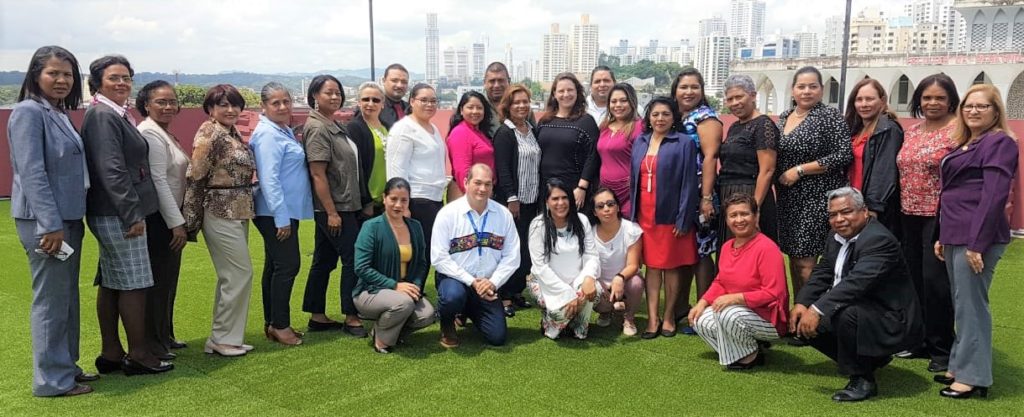With the objective of strengthening the International Nursing VHL and outlining cooperation strategies for creating and strengthening its information sources in Latin America and the Caribbean, Portugal and Spain, the XIII International Meeting of this VHL was held on September 24, in Panama City, Panama.
The meeting took place on the occasion of the XV Conferencia Iberoamericana de Educación en Enfermeria and the XIII Meeting of International Networks of the field. Ten countries participated in the meeting: Brazil, Chile, Colombia, Costa Rica, Cuba, El Salvador, Mexico, Panama, Portugal and Uruguay; it was coordinated by Professor Francisco Lana of the Nursing School at Universidade Federal de Minas Gerais, in Brazil.
Representatives from each country shared the state of the art on scientific information in nursing from their countries, including existing journals, if there are organized information sources, among other topics. Among the countries that already have an organized space in the Regional portal, a few can be highlighted:
- Brazil, for the projects on Second Formative Opinion, the knowledge showcase on History of Nursing that should be launched soon, and the catalogue of websites on the field;
- Mexico, for the Clinical Practice Guides, the selection of the theses for admission in the database and the Mexican Network of Editors of Scientific Nursing Journals – RedMerce;
- Colombia, for the support of the Asociación Colombiana de Facultades de Enfermería – ACOFAEN, which has assured a yearly budget for supporting the activities of the network within the country, and the inclusion of its meeting in the Coloquio Nacional de Investigación de Enfermería, which is held every two years.
 Besides these countries, Chile and Portugal, which have been participating of the network meetings and are part of the International Committee for the Evaluation of journals, also presented the status of scientific and technical information in their countries. Both countries decided to start the process for the creation of their national networks, and to integrate them to the Nursing VHL by 2020. Costa Rica and Uruguay also presented their experiences, and there is also a good work perspective with El Salvador.
Besides these countries, Chile and Portugal, which have been participating of the network meetings and are part of the International Committee for the Evaluation of journals, also presented the status of scientific and technical information in their countries. Both countries decided to start the process for the creation of their national networks, and to integrate them to the Nursing VHL by 2020. Costa Rica and Uruguay also presented their experiences, and there is also a good work perspective with El Salvador.
Other topics that were addressed during the meeting were: the Rev@Enf Portal, which has a 2020-2023 calendar of activities for the adhesion to open science; theses and dissertations, with the perspective of broadening collaboration through post-graduate programs; the International Committee for the Evaluation of Journals of the Nursing VHL, where the work plan of the committee was presented and the results of the evaluation of five journals for integrating BDENF and LILACS were approved; social networks with the presentation of the page reach for the Nursing VHL page on Facebook; the perspective of expansion and the formation of an international editorial committee.
Since Panama was hosting the event, it was an opportunity to work with the country’s VHL Network. Thus, on September 25, the Virtual Health Library (VHL) held a Meeting with the country’s Cooperating Centers and BIREME. The meeting was held at the Simón Bolívar Library, at the Universidad de Panamá.
 Approximately 30 information professionals attended the meeting, scientific editors, and professors from different regions of Panama. The event was organized by the Biblioteca Nacional de Salud of the Universidad de Panamá – coordinated by the VHL network in the country, and the Pan American Health Organization (PAHO), through the Knowledge Management Center of Panama and the Latin American and Caribbean Center for Health Sciences Information – BIREME/PAHO/WHO.
Approximately 30 information professionals attended the meeting, scientific editors, and professors from different regions of Panama. The event was organized by the Biblioteca Nacional de Salud of the Universidad de Panamá – coordinated by the VHL network in the country, and the Pan American Health Organization (PAHO), through the Knowledge Management Center of Panama and the Latin American and Caribbean Center for Health Sciences Information – BIREME/PAHO/WHO.
Joanita Barros, librarian at BIREME, presented the Virtual Health Library model, the LILACS database and showed guideline for collaborative work and the strengthening of the National VHL. Isaías Montilla of PAHO Panama also shared with the network during the Workshop the challenges, work initiatives and tasks for the consolidation of VHL Panama, the importance of this model for the promotion of information produced in the country and the importance of participation of the network during the entire process.
According to Dr. Diego González, Director of BIREME, “working in the strengthening of the national and regional nursing networks, as well as promoting and developing the Virtual Health Library on the field, are priorities for the Center and one of our contributions to Primary Health Care and Universal Health”.